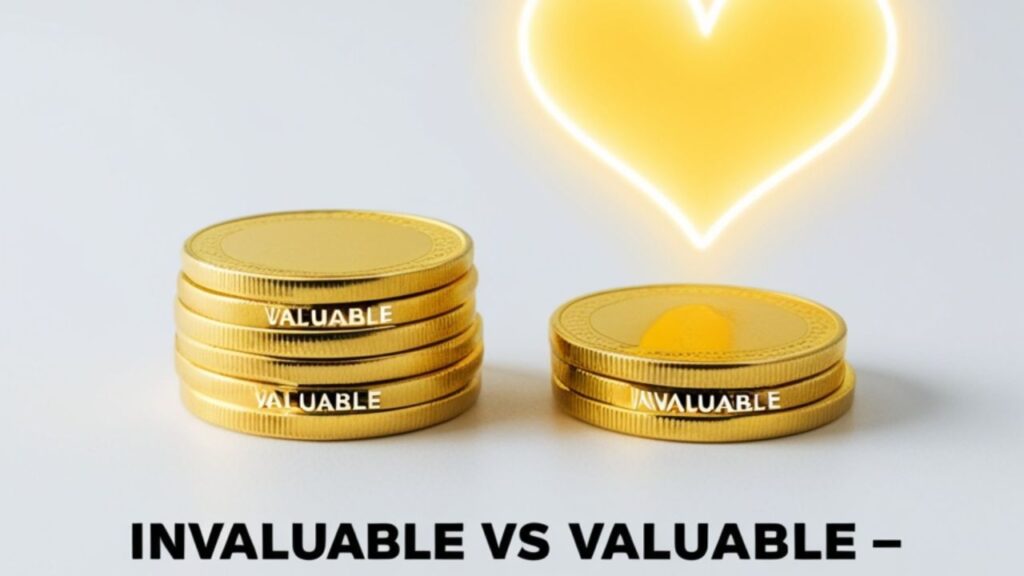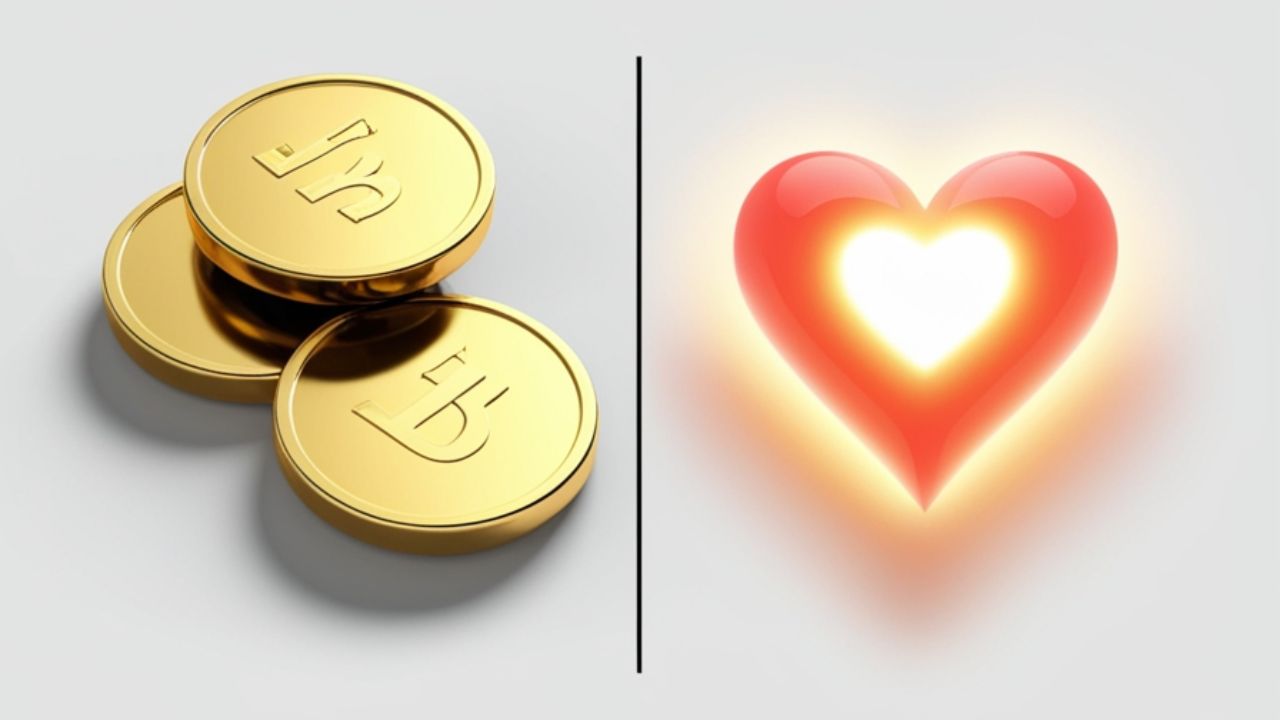Invaluable means something so special that no amount of money can describe its true worth. It shows deep feelings or importance, like a friend’s help or a teacher’s support. These moments or actions hold endless meaning that goes beyond simple value.
Valuable describes things that have clear, measurable worth. It can mean money, time, or effort that helps you reach a goal. For example, a valuable lesson or book teaches something useful that you can apply in real life or studies.
The main difference is that invaluable expresses emotional or unmeasurable importance, while valuable shows practical or financial worth. Knowing when to use each helps you speak and write clearly. It also shows that you understand how language gives meaning to value.
The Core Meanings of “Valuable” and “Invaluable”
Valuable shows something that has real worth or usefulness. It can be money, time, or knowledge that helps people in daily life. A valuable item or idea gives clear benefits and makes life easier or more successful for everyone.
Invaluable describes something that means more than money can measure. It often connects to feelings, love, or care. For example, a parent’s guidance or a friend’s support is invaluable because it brings comfort, strength, and lasting happiness.
Why This Matters
- Knowing how to use valuable and invaluable helps you share ideas clearly and avoid confusion in writing or speech.
- Using the right word shows respect for meaning and helps express both real and emotional worth.
- Understanding each term improves language skills and builds confidence in communication.
Etymology and Word Origins: Why “Invaluable” Isn’t the Opposite of “Valuable”
The word valuable comes from the Latin word valere, meaning “to be strong or worthy.” It shows things that have clear or measurable worth. People use it for items, time, or ideas that bring real help or benefit in life.
The word invaluable uses the prefix “in-,” but here it does not mean “not.” It makes the meaning stronger, showing something so precious that no amount can measure it. This difference makes invaluable express greatness beyond simple value.
| Word | Origin | Meaning |
| Valuable | Latin valere (“to be strong, to have worth”) | Has measurable worth |
| Invaluable | Prefix in- + valuable | Too great to measure; invaluable does not negate valuable |
Common Misconceptions
Many people think invaluable means “not worth anything,” but that is not correct. The word shows something so special that no one can put a price on it. It expresses great importance, care, and emotional strength in simple, clear ways.
Another common mix-up happens when someone uses valuable instead of invaluable in emotional situations. Valuable fits when worth can be measured, like time or money. Invaluable fits when feelings, love, or guidance mean more than anything you can count.
See also : Shed Some Light – Meaning, Usage & Synonyms Explained
Valuable vs. Invaluable in Everyday Usage

- Valuable describes things with clear worth, like money, time, or useful advice that helps in daily life.
- Invaluable expresses deep importance, such as love, trust, or guidance that cannot be measured.
- Choosing correctly makes speech and writing clearer, stronger, and more meaningful.
Tone and Register
- Valuable fits both formal and casual settings when describing practical worth or usefulness.
- Invaluable suits emotional or respectful moments, such as speeches, letters, or praise.
- Choosing the right tone helps your words sound polite, thoughtful, and well-matched to the situation.
Emotional and Cultural Weight of Each Word
The word valuable often links to things that help people grow or improve their lives. It shows respect for effort, skill, or time. When something is valuable, it gives real benefit and teaches lessons that stay with a person for long.
The word invaluable carries deep emotional meaning in many cultures. It is used for kindness, love, or sacrifice that no one can measure. When people say something is invaluable, they show deep gratitude and honor its lasting emotional power.
Context Matters
| Context | Used Word | Connotation |
| Finance | Valuable | ROI, market worth, assets |
| Education | Invaluable | Mentorship, guidance, lifelong impact |
| Healthcare | Invaluable | Compassion, emotional courage |
| Military | Invaluable | Bravery, sacrifice, foundational impact |
Comparing Real Sentences: Choosing the Right Word
| Context | Incorrect Usage | Correct Usage | Why It Matters |
| Feedback session | “Your comments were invaluable to the project.” | Correct: “invaluable” signals deep impact | The feedback wasn’t merely useful – it shaped outcomes beyond expectations. |
| Financial report | “That report is invaluable.” | Better: “valuable” if it holds concrete data | Using “invaluable” might exaggerate; here, measurable value matters. |
| Graduation speech | “Her support was valuable.” | Better: “invaluable” for emotional significance | The speaker honors lasting, immeasurable encouragement. |
| Coaching memo | “You’ve provided invaluable figures.” | Wrong: Figures are measurable – “valuable.” | Avoid mixing metaphoric and literal worth in serious documents. |
Common Mistakes and Misconceptions
- Many people wrongly think invaluable means “not worth anything,” but it means “too precious to measure.”
- Some use valuable in emotional situations where invaluable fits better.
- Mixing both words can confuse meaning and weaken clear communication.
See also : Oeuvre Meaning and Usage in English Explained Clearly
Real-World Blunders
- People sometimes call a valuable item invaluable, which changes the meaning and sounds incorrect.
- Advertisements often use invaluable for simple products, making the message seem exaggerated.
- Writers mix both words in formal reports, causing confusion about emotional or measurable worth.
Valuable and Invaluable Across Professions
| Profession | Top Usage | Example |
| Finance | Valuable | “This asset remains valuable despite market changes.” |
| Education | Invaluable | “Her mentorship proved invaluable to my academic growth.” |
| Healthcare | Invaluable | “Nurses provide invaluable emotional support.” |
| Military/Public Service | Invaluable | “Their sacrifice was invaluable to our national security.” |
Synonyms & Alternatives for ‘Valuable’ and ‘Invaluable’

| Meaning | Synonyms | Best Use Case |
| Measurable worth | beneficial, useful, worthwhile | Business, finance, productivity contexts |
| Immeasurable impact | priceless, irreplaceable, priceless | Emotional, cultural, historical homage |
Final Thoughts
The word valuable helps describe things that have real and clear worth. It can be time, money, or skill that makes a difference. Using it correctly helps people speak clearly and show respect for effort or achievement.
The word invaluable expresses deep feelings and lasting meaning. It shows something so important that it cannot be measured. Knowing how to use both words builds stronger communication and helps express thoughts with care and understanding.
FAQs
Is invaluable a good thing?
Yes, invaluable is a good thing. It means something so precious and important that its true worth cannot be measured in money.
What does “invaluable” mean?
Invaluable means something extremely precious, useful, or important. It describes things or people whose worth is beyond price or measurement.
Why do people say invaluable?
People say invaluable to show great respect or gratitude for something that holds deep emotional or lasting importance beyond material value.
Is invaluable a contronym?
No, invaluable is not a contronym. The prefix “in-” here makes it stronger, meaning “too valuable to measure,” not “without value.”

Join Bibcia on a journey to master English grammar. Discover easy lessons, writing tips, and practical examples designed to make learning grammar simple and effective.










